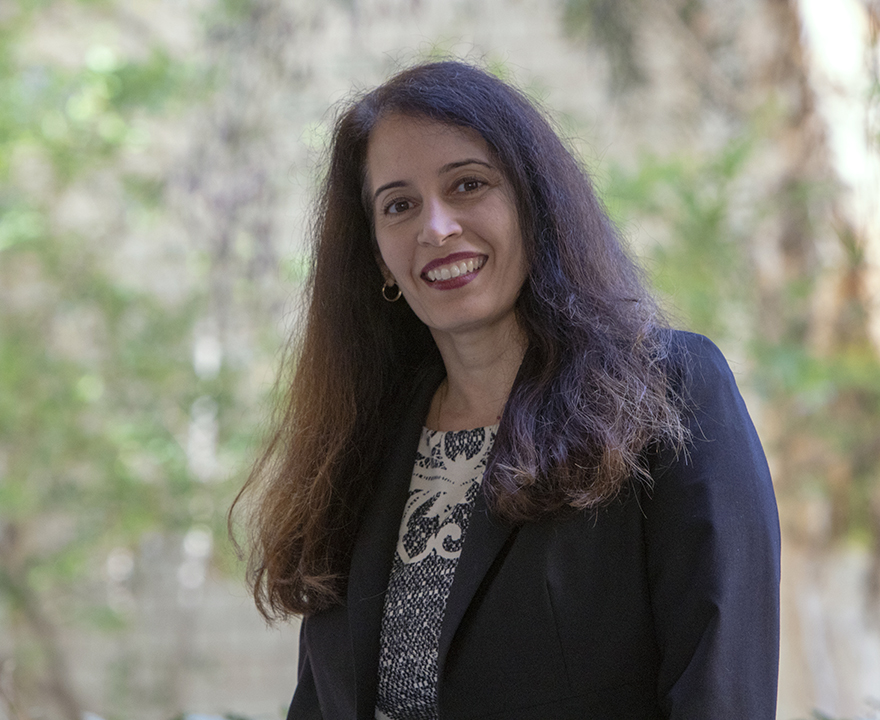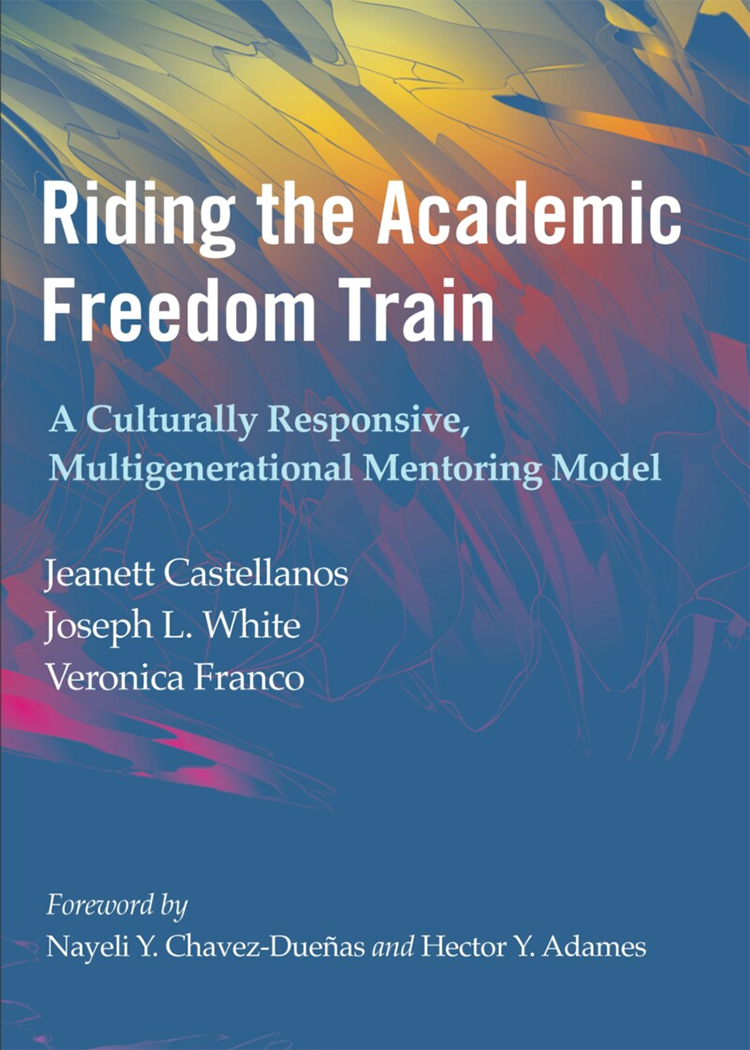Riding the Academic Freedom Train: A Culturally Responsive, Multigenerational Mentoring Model

Riding the Academic Freedom Train: A Culturally Responsive, Multigenerational Mentoring Model
- September 13, 2022
- Book by Jeanett Castellanos, UCI social sciences professor of teaching, presents framework to help students – particularly underrepresented and first-generation undergrads – thrive
-----
 Mentors serve a critical role in helping students – particularly underrepresented
and first-generation scholars – thrive in higher ed. In her new book, Riding the Academic Freedom Train: A Culturally Responsive, Multigenerational Mentoring
Model, UCI social sciences professor of teaching Jeanett Castellanos and co-authors present
a framework designed for educators who provide guidance and support to students navigating
new and difficult terrain. Below, Castellanos talks about the book’s more than 50-year-old
origin story and some best practices for instructors, professors and academic leaders
to become culturally responsive agents of community building.
Mentors serve a critical role in helping students – particularly underrepresented
and first-generation scholars – thrive in higher ed. In her new book, Riding the Academic Freedom Train: A Culturally Responsive, Multigenerational Mentoring
Model, UCI social sciences professor of teaching Jeanett Castellanos and co-authors present
a framework designed for educators who provide guidance and support to students navigating
new and difficult terrain. Below, Castellanos talks about the book’s more than 50-year-old
origin story and some best practices for instructors, professors and academic leaders
to become culturally responsive agents of community building.
Q: Tell us about the book's origins, particularly where the Academic Freedom Train title comes from and what it means.
A: The Academic Freedom Train is an educational network that teaches students to own their personal strengths. Composed of multiple mentors and generations, it bridges formal education to students’ identities and experiences. The late professor Joseph L. White founded the Academic Freedom Train, reflecting the power of the Underground Railroad and the role of leading, guiding, supporting, and empowering those navigating difficult terrains. To find their way through the unfamiliar canvas of higher education, BIPOC and first-generation students need the benefit of a guide, a mentor, an innovative and experienced individual who can provide support.
The Academic Freedom Train is a community of scholars and practitioners that form a network to help students to navigate and thrive in higher education. Its purpose is to facilitate BIPOC and first-generation students’ academic access and success. It emphasizes collectivism, family, connection, and ancestral wisdom. Mentors offer hope, work collaboratively with younger generations, and maximize students’ potential. Through mentoring, innovative programming, and collective efforts, the Freedom Train transforms the current educational climate for BIPOC students to navigate and succeed.
Q: Your research shows mentorship to be a critical practice in academia for improving student retention and success, particularly among BIPOC and first-generation students. What practices do you find to be most effective, and how can senior administrators help foster an environment where mentorship thrives?
A: Mentoring is an active verb that requires time, investment, and dedication. Mentoring encompasses the practice of building on the collective dream. It is about honoring students’ families, promoting social justice, ensuring civil rights, honoring elders, and paying it forward. It is also about inclusiveness – having students feel respected, appreciated, and valued. Effective mentoring for BIPOC and first-generation students entails holistic mentoring – accounting for both the professional and the personal. It extends beyond academic development, to build confidence, empower, and validate. Many Freedom Train mentors see the practice of mentoring as “nurturing the psyche” and nurturing the love of learning in mentees. It bridges educational dreams to purpose and meaning. Mentoring is relational and emancipating. Our practice of mentoring addresses power, systemic racism, sexism, classism, heterosexism, and the marginalization of minoritized groups. To be most effective, higher education administrators must address the “isms,” be service agents, and work toward reaching a mutual understanding across groups, finding common ground while working toward racial reconciliation. They must evaluate the climate of each program, the number of BIPOC faculty, and the support available for mentees. They must recognize the importance and value of mentoring – find ways to train faculty to be effective in these practices, institute and reward faculty-student mentoring, and provide incentives for faculty-student mentoring.
Q: How does your training in psychology and education inform your mentorship practices and those detailed in the book?
A: Rooted in liberation psychology, as Freedom Train mentors, we offer much more than professional development opportunities. The mentoring relationship is not solely task oriented. Our ties are relational, validating, and emancipating. Our mentoring practices unpack racism and invite BIPOC students to identify and own their strengths, dream big, reflect on the collective dream, and embrace possibility. We encourage students to engage in self-reflection, self-understanding, cultural affirmation, and validation. We address the complexity, impact, and evolution of racism, disrupt oppressive systems, and engage in open dialogue and discussion centered on race, minoritized experiences, cultural biases. We teach mentees how to navigate marginalizing spaces and introduce coping practices – ultimately leading to much more than survival – to thriving and success. Our mentoring addresses academic self-efficacy and equips students to be scholar-activists and leaders.
Q: This guidebook is co-authored with your mentor, Dr. Joseph L. White, who passed before the piece was completed. What does it mean to you having this multigenerational work now available?
A: The book highlights a 50+ year mentoring model that has enabled hundreds of BIPOC and first-generation students to achieve extraordinary heights in their chosen professions. The model builds on a network of mentors that represent different generations. It is about connecting future generations to the network. Upon the early stages of the book, Dr. White stressed the value of the blend of generational perspectives. He worked hard to have three generations represented in our writings. An innovative and creative academic, Dr. White always understood the importance of our younger generations, their perspectives, experiences, and creativity. He centralized their experiences in his mentoring processes. Today, the book is addressed to faculty, academic deans, and department chairs in higher education. Centered on the notion of community and the collective, the book showcases the power of multigenerational mentoring and provides educators a guide toward becoming culturally responsive mentors and agents of community building.
Riding the Academic Freedom Train: A Culturally Responsive, Multigenerational Mentoring Model is co-authored by Jeanett Castellanos, UCI social sciences professor of teaching, Joseph L. White (1932-2017), UCI social sciences professor emeritus, and Veronica Franco, doctoral candidate in counseling, clinical, and school psychology, UC Santa Barbara.
-----
Would you like to get more involved with the social sciences? Email us at communications@socsci.uci.edu to connect.
Share on:
Related News Items
- Careet RightFirst-rate advice for first-year and first-generation Anteaters
- Careet RightFirst-rate advice for first-year and first-generation Anteaters
- Careet RightCastellanos named 2022-23 Chancellor's Faculty Award Recipient for Undergraduate Mentorship in social sciences
- Careet RightCastellanos elected to American Association of Hispanics in Higher Education Board of Directors
- Careet RightA distinguished career of service


